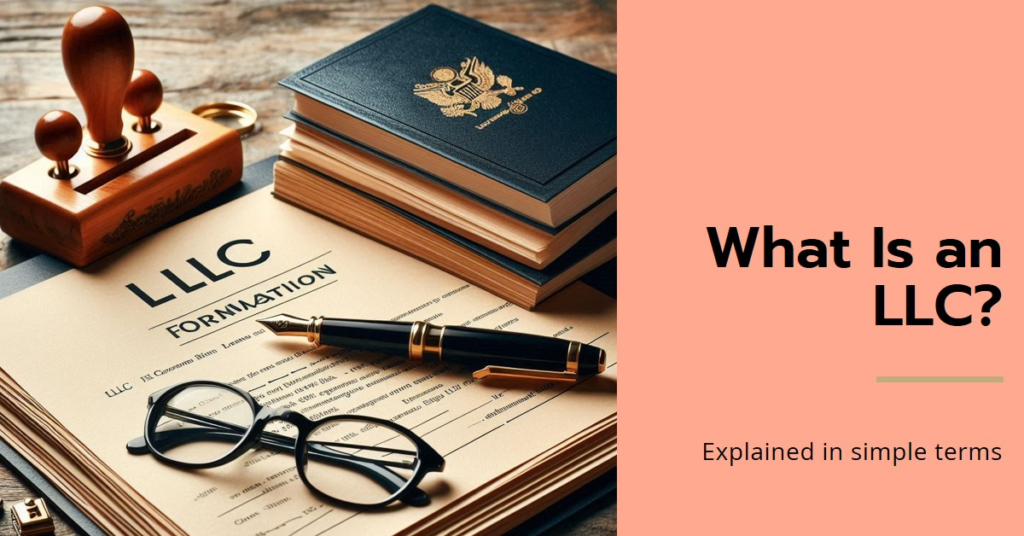A Limited Liability Company (LLC) is a popular business structure in the U.S., providing flexibility, tax benefits, and protection for business owners. It’s a hybrid structure that blends the best features of corporations and partnerships. But what is an LLC, exactly? And how does it work? This article will walk you through the LLC business […]

What is an LLC and Why Should You Consider Forming One?
Blueprint
A Limited Liability Company (LLC) is a popular business structure in the U.S., providing flexibility, tax benefits, and protection for business owners.
It’s a hybrid structure that blends the best features of corporations and partnerships. But what is an LLC, exactly? And how does it work?
This article will walk you through the LLC business structure, how it’s formed, and taxed, and how it can be maintained, providing a complete overview for anyone considering this business model.
What is an LLC and How Does It Work?
An LLC, or Limited Liability Company, is a business structure designed to offer its owners (called members) personal liability protection while allowing for flexible tax options.
An LLC essentially separates the members’ assets from the business liabilities.
If the business incurs debts or faces lawsuits, the members’ assets (like their homes or cars) are typically shielded from being seized.
What Makes an LLC Different from Other Business Structures?
Unlike sole proprietorships or partnerships, LLCs provide limited liability protection to their members.
This protection means that members are not personally responsible for the company’s debts or legal liabilities, a key advantage for small and medium-sized business owners.
Additionally, LLCs offer more tax flexibility than corporations, making them an attractive option for many entrepreneurs.
How is an LLC Structured?
To fully understand what is an LLC, it’s important to know how it is structured.
The structure of an LLC is designed to provide both flexibility and simplicity.
Here’s a breakdown of the main components:
Members and Ownership
The owners of an LLC are called members. An LLC can have one member (a single-member LLC) or multiple members (a multi-member LLC).
What sets LLCs apart from corporations is that there are no restrictions on the number or type of members. Individuals, other businesses, and even foreign entities can own an LLC.
Management Structure
LLCs offer flexibility in how they are managed. They can be:
- Member-managed: The members handle the day-to-day operations and decision-making.
- Manager-managed: The members appoint a manager (who may or may not be a member) to oversee the operations.
Understanding what is an LLC also involves recognizing that this flexible management structure allows LLCs to tailor their business operations to fit their specific needs.
What Steps Are Involved in Forming an LLC?
Now that we’ve addressed what is an LLC, let’s dive into how you can form one.
Although the exact process can vary from state to state, the following are the key steps involved in forming an LLC:
1. Choose a Name
The first step is choosing a name for your LLC. The name must be unique within your state and include “Limited Liability Company” or its abbreviations (LLC or L.L.C.)
It’s essential to perform a name search to ensure that your desired LLC name is available in your state.
2. File Articles of Organization
To officially form your LLC, you’ll need to file Articles of Organization with your state’s business registration office.
This document includes basic information such as the LLC’s name, address, and member details.
The filing fee for this document varies by state, typically ranging between $50 and $500.
3. Appoint a Registered Agent
A registered agent is a person or business entity responsible for receiving official legal documents on behalf of the LLC.
The registered agent must have a physical address in the state where the LLC is formed.
4. Create an Operating Agreement
Though not mandatory in every state, drafting an Operating Agreement is highly recommended.
This document outlines the internal workings of the LLC and is especially useful if you have multiple members.
5. Obtain an EIN
An Employer Identification Number (EIN) is required for tax purposes and for opening a business bank account.
The IRS provides EINs for free, and they are necessary for LLCs with employees or multiple members.
Here is an in-depth step-by-step guide video highlighting how to set up your LLC, the right way;
How is an LLC Taxed?
Taxation is one of the most important considerations when forming an LLC.
To truly understand what is an LLC, it’s crucial to grasp how taxes work for this business structure.
LLCs are taxed differently based on their specific classification and the choices made by the members.
Pass-through Taxation
By default, an LLC operates under pass-through taxation, meaning the business itself does not pay taxes.
Instead, the profits and losses of the LLC are “passed through” to the members, who report them on their tax returns.
This avoids the double taxation that corporations face, where both the company and the shareholders are taxed.
Electing Corporate Taxation
LLCs can also choose to be taxed as a C corporation or S corporation. In a C corporation structure, the LLC is taxed separately from its members, while in an S corporation, the profits are still passed through.
However, only members’ salaries are subject to self-employment taxes, potentially reducing the overall tax burden.
Self-employment Taxes
In most cases, LLC members must pay self-employment taxes on the LLC’s profits, which cover Social Security and Medicare contributions.
This is something members need to factor into their overall tax planning.
What is Required to Maintain an LLC?
Once you understand what is an LLC, it’s important to know how to keep it in good standing.
LLCs require ongoing maintenance to remain compliant with state and federal regulations.
Here’s how you can maintain an LLC:
File Annual Reports
Most states require LLCs to file an annual report that updates the state on the LLC’s current address, registered agent, and member information.
There is usually a fee associated with this filing, and failure to submit the report could result in penalties or the LLC being dissolved.
Pay Annual Fees
LLCs are also required to pay an annual fee to the state.
This fee varies by state, with some states charging as little as $50 and others, like California, charging up to $800.
It’s important to stay on top of these payments to avoid losing your LLC’s good standing.
Separate Finances
To ensure that you continue benefiting from the LLC’s limited liability protection, it’s essential to keep business finances separate from personal finances.
This means maintaining a dedicated business bank account and not mixing personal expenses with LLC funds.
Final Thoughts
Now that we’ve answered the question, of what is an LLC, you can see why it’s such a popular business structure.
With its blend of liability protection, flexible management, and advantageous tax options, forming an LLC is a solid choice for entrepreneurs looking for a straightforward, yet highly effective way to structure their business.
By understanding what an LLC is and how it works, you can make informed decisions about whether this business structure aligns with your goals.
Whether you’re looking to limit your liability or gain tax advantages, an LLC could be the right fit for you. Make sure to follow the formation steps and maintain compliance to enjoy the benefits this flexible structure offers.
Frequently Asked Questions
What is an LLC?
A Limited Liability Company (LLC) is a business structure that offers personal liability protection to its owners (called members) and provides flexible management and tax benefits. It combines elements of corporations and partnerships.
What are the benefits of forming an LLC?
The main benefits of an LLC include limited liability protection, pass-through taxation, flexible management options, and fewer compliance requirements compared to corporations.
How is an LLC different from a corporation?
Unlike corporations, LLCs offer pass-through taxation, meaning the profits and losses are reported on the owners’ personal tax returns, avoiding corporate taxes. Additionally, LLCs have fewer formalities and reporting requirements.
Who should consider forming an LLC?
Entrepreneurs and small business owners looking for personal liability protection and tax flexibility should consider forming an LLC. It’s particularly beneficial for businesses with potential legal risks or multiple owners.
What are the tax advantages of an LLC?
LLCs offer pass-through taxation, meaning the business itself does not pay taxes. Instead, profits are passed to the members, who report them on their personal tax returns. LLCs can also elect to be taxed as a corporation if beneficial.




